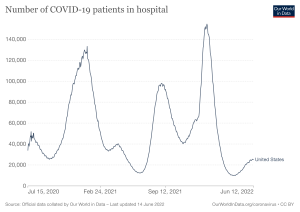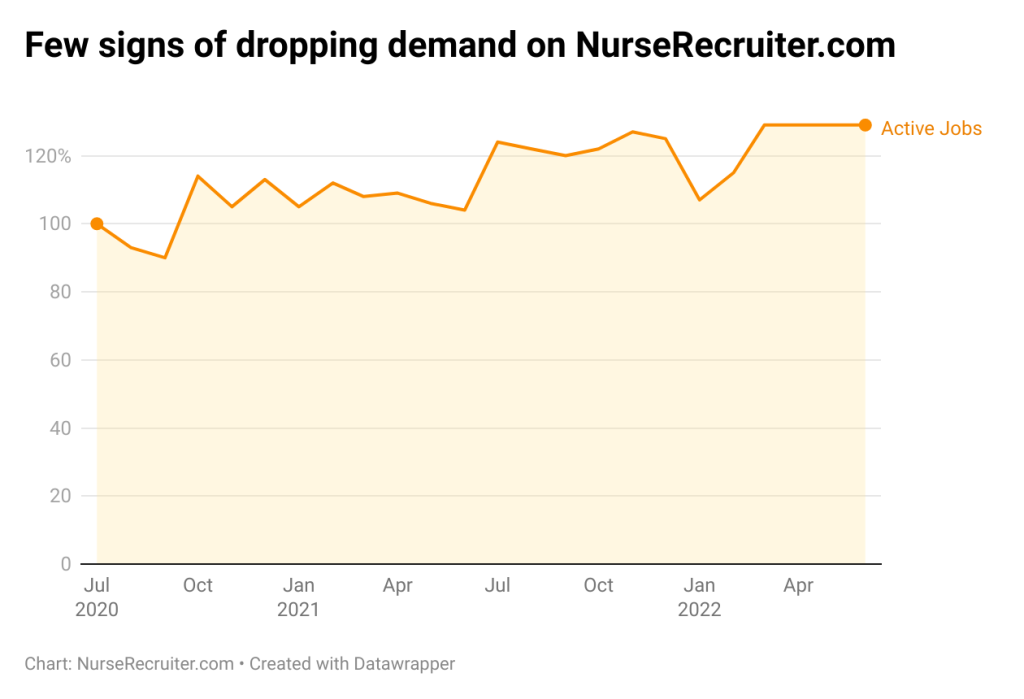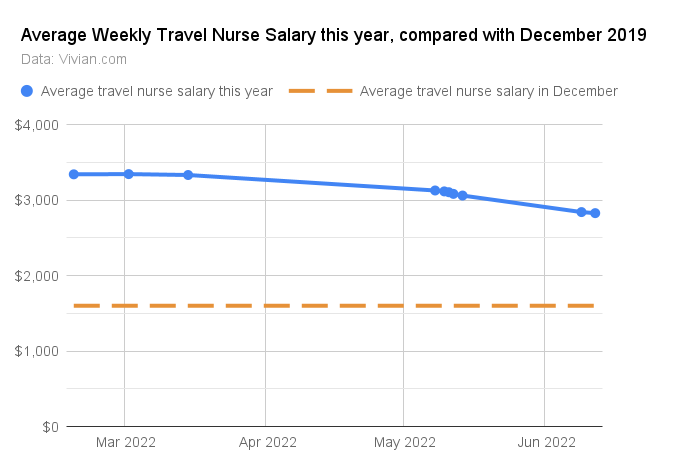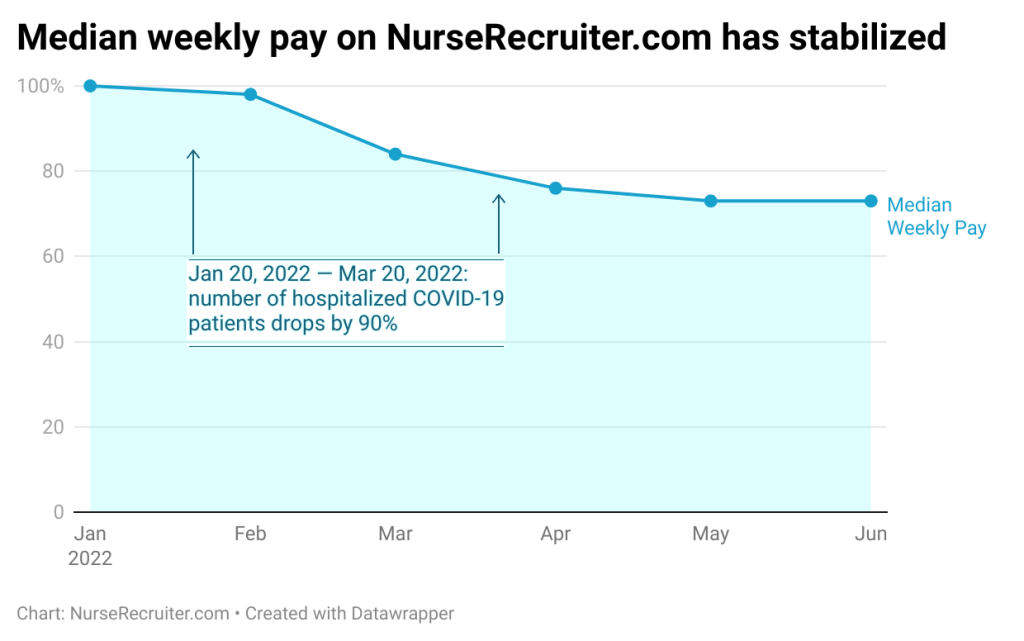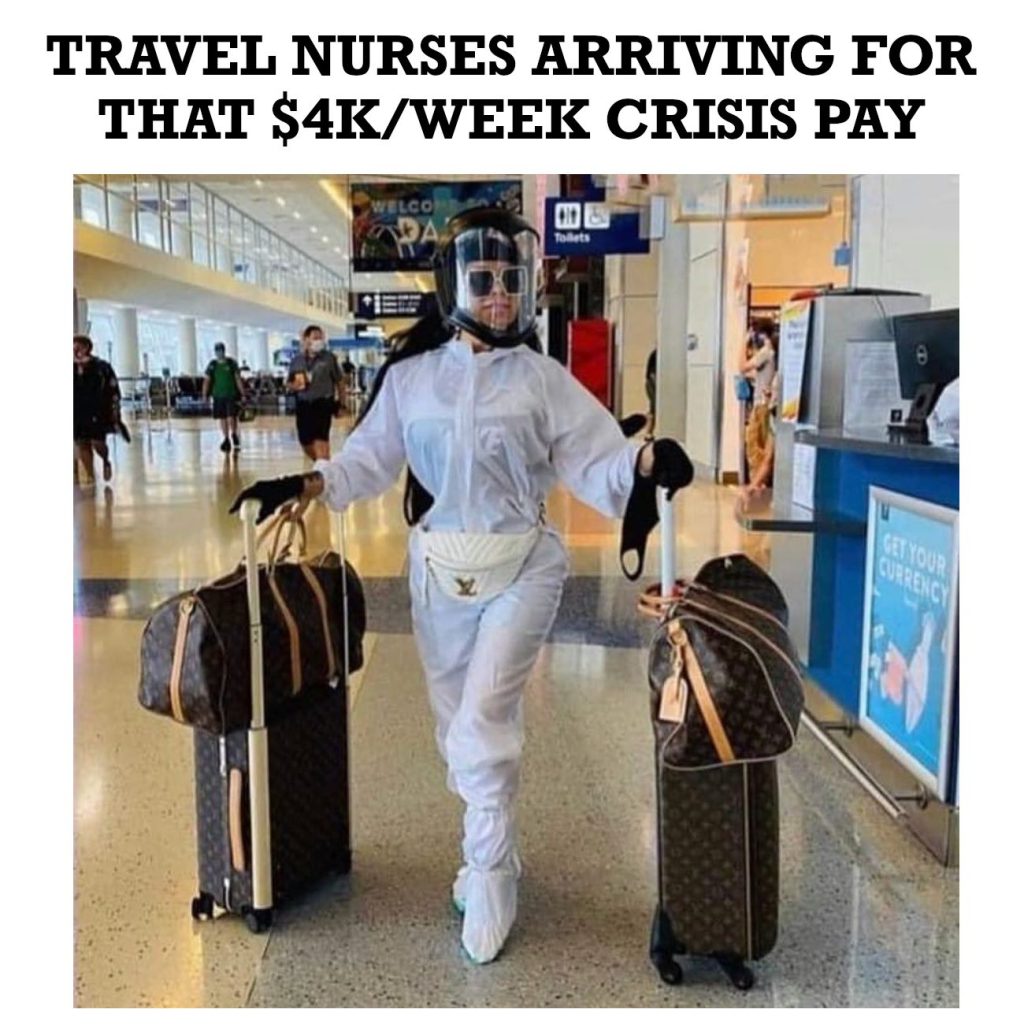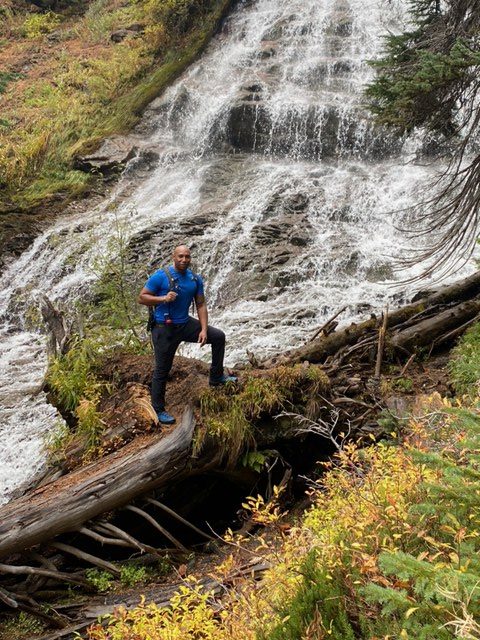Imagine the shock: you’re half way down your drive from Florida to Wyoming for a travel nursing job, and you hear your contract has been canceled. No warning, no caveats: you simply thought you had a job, and then you didn’t, and now you have nothing to return to.
Read also: This Is Where Nurse Wages Are Highest — and Where Your RN Salary Is Worth the Most!
Early last month, stories like these suddenly seemed to proliferate, raising anger and alarm. After a year or two when it seemed like the sky was the limit for travel nursing pay and opportunities, news media across the country reported findings by Kaiser Health News that demand for RN travelers had dropped by a third within a month, and pay was dropping fast.
Travel nurses offered their personal stories: they packed up their whole family to become a travel nurse halfway across the country, only to be canceled during orientation. Or they accepted a travel contract based on a firm commitment about the rate they’d be paid, but after accepting, relocating, and renting accommodation they were suddenly offered a much lower rate — take it or leave it.
Don’t hit the panic button
But hold on a moment. Speaking of caveats: there is more than meets the eye to this story.
The drop in demand was partly the result of a perfect storm, something very specific to what was happening this spring. Objectively, part of it was actually good news. In less than three months, the number of hospitalized Covid patients had fallen from over 150,000 to barely more than 10,000. But that meant Covid relief funding from federal and state authorities to hire travel nurses evaporated.
By the time the story about demand dropping by a third hit the press, the data were already outdated, referring to “the month leading up to April 10”. Since then, numbers seem to have stabilized. By late last month, the San Diego Business Journal reported, staffing companies “said the demand remains high with far more openings than nurses to take them”.
Examining data about the average number of monthly active nursing jobs on our own website, we found that earlier increases have leveled off, but it is still close to the highest it has been in at least two years. The number of active jobs is up 29% from two years ago, and higher than it was a year ago.
So let’s pick this apart for a moment, because there are really two different things to point out here.
When they break their word, don’t take it lying down
Did an agency pull a stunt like this with you, personally? Did your contract suddenly get cancelled? Were you confronted with a last-minute pay cut, or was your rate cut dramatically halfway through your contract? What they’re doing might be illegal.
The fine print in the contracts you sign is important, of course. But Austin Moore, an attorney at Kansas City law firm Stueve Siegel Hanson, told NBC News that some agencies are “breaching their contracts” or even “committing outright fraud” with such bait-and-switch maneuvers.
They specialize in representing healthcare workers and opened an investigation in “potential claims against staffing agencies for taking advantage of traveling nurses,” calling on nurses to get in touch about their stories. “Our phones are ringing off the hook,” Moore said.
Overall prospects for travel nursing remain rosy
But what about the rest of you — should you fear that the travel nursing boom is turning into a bust?
Wind back the clock for a moment. Before the pandemic broke out, in December 2019, “average total weekly wages for a travel nurse were about $1,600,” Becker’s Hospital Review recalled last summer. “A year later, the weekly average pay was more than $3,500.”
They got those numbers from the healthcare recruiting company Vivian Health, and using that same source (with a little help from the Internet Archive) we can see how salaries have compared this year. While the NBC story told of nurses “seeing their rates slashed as much as 50 percent midcontract,” it turns out that in reality the change has been much more incremental.
In early March, the average travel nurse salary was $3,343 — still very close to that 2020 peak. Now it’s at $2,826, down 15% — but still up more than 75% from 2019 levels, and declining only gradually. According to the Indeed.com page on travel nurse salaries, which only shows the (lower) average base salary, they have actually gone up since: from $2,219 on April 10 to $2,385 now.
Again, we examined our own data as well, going back to the very start of the year. And yes, you can clearly see a drop in the median travel nurse salary in March and April, when Covid-19 numbers had declined drastically and associated funding dried up. But they have also clearly stabilized since.
That’s because demand remains healthy, as the president of AMN Healthcare’s travel nurse division pointed out two weeks ago. The demand for travel nurses “has eased but remains about 80% above pre-pandemic levels,” she said.
The workforce shortage preceded the pandemic and health care employers will continue to need those contract nurses, Bobby Conlon confirmed to Hospice News. He’s the senior national staffing manager for Interim HealthCare, and said: “Although we expect the demand for nurses will experience some pull-back, it will remain elevated throughout the rest of 2022 compared to pre-COVID” and rate decreases will be “modest”.
Take the responsibility, reap the rewards
Travel nursing pay has always fluctuated seasonally — that’s one of the downsides. It’s why you should always save or invest some of your dearly earned income, especially when rates are high (and preferably not in, like, Bitcoin).
But the sad fact is that the continued refusal of many healthcare employers to invest in the kind of long-term improvements to working conditions that would genuinely persuade more nurses to stay on long-term as staff keeps turnover rates high. And as long as they wrestle with such shortages, travel nurses will fill a dire need, and be paid handsomely for it.
And let’s be honest, they deserve it. Throughout the pandemic, it was travel nurses who went into the hot spots where conditions were most challenging, tackling the country’s worst healthcare crises — and they are expected to deal with them after just two or three days of orientation. All while being far from home and their established social networks of friends and family.
“In 2021, I worked on Christmas and then I came home to an empty house that I was renting,” travel nurse Courtney Lee told the San Diego Business Journal. “There is a side to it that can be tough”. There are rewards too, of course! The adventure of discovering new places, the joy of making new friends, the improved work/life balance that comes with greater flexibility, the investment of expanding your professional skillset. But it’s only right that there should be a financial incentive as well.
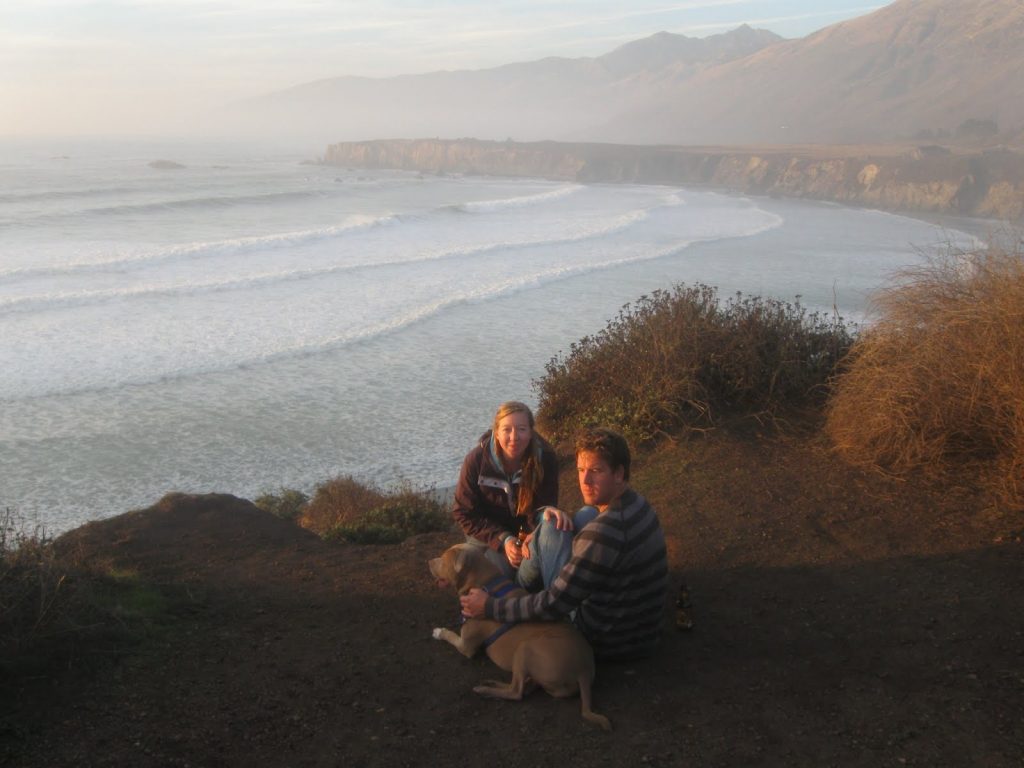
Weren’t they going to cap travel nurse pay?
But hold on a moment — wasn’t there some big push to cap travel nurse wages? Good question! What can we say: it’s never a bad idea to keep an eye on what the politicians are up to.
Earlier this year, demands were raised in Congress to investigate potential “anticompetitive activity,” and some state legislatures introduced bills to regulate staffing agencies to prevent alleged profiteering. As the examples of abusive practices above illustrate, there is something to be said for regulation, but these efforts kept focusing on capping agency pay.
Travel nurses did not take kindly to the proposals, suggesting politicians should cap hospital CEO pay instead, which has boomed during the pandemic.
It also seemed to lack plain common sense. “Let’s say they cap our rate at 5K, if there’s another [COVID] surge they will most likely not get much RN’s wanting to help,” one Facebook post quoted on Nurse.org pointed out. “Right?,” another chimed in: “If they cap, why would anyone want to go help with surges. I’m not going into a hot mess doing more work when I can stay capped right where I am for less work.”
But should they worry? Maybe not. While states ranging from New York, Pennsylvania and Maryland to Indiana, Idaho and Kansas “introduced bills to address price gouging,” Skilled Nursing News reported this month, “none made it past committee votes”. So far, it appears only Minnesota and Massachusetts have agency wage caps, which predate Covid-19 (and were raised during the pandemic).
In the U.S. Congress, Senator Kevin Cramer (R-ND) did introduce The Travel Nursing Agency Transparency Study Act earlier this month, which would require the Government Accountability Office to investigate agency practices. Measures would be slow to materialize even if it were passed, however, and it claims to focus on “the difference between the rates contracted nurses were paid and how much facilities were charged” rather than the pay received by travel nurses themselves.
For its part, the the American Hospital Association (which has called for an investigation into claims of “price gouging” by agencies) insists that it “has not advocated in any forum for a cap on travel nurse wages”.
For some travel nurses, a change in focus sounds pretty good
We do have to flag one thing: some gradual structural change is inevitable. Let’s be frank, hospitals have long underinvested in the nurses they had, which meant that staff nurses had few qualms about jumping ship when travel nursing rates soared — who can blame them? But “it became a vicious cycle,” Texas Nurses Association CEO Cindy Zolnierek explained:
“Nurses were leaving hospitals to travel because they could make more money and have different experiences and travel to different places. In turn, it made the shortage in hospitals worse. So it increased the demand, which made the rates go up, which attracted more nurses to go to traveling [nursing] rather than stay in their hospitals”.
The end result: those same hospitals had to hire back nurses at much steeper rates than they’d been willing to pay their original staff, which is unsustainable in the long term. That expensive lesson has been sinking in, ever so slowly, and employers who knew they couldn’t keep bleeding money have started to focus more on recruiting full-time nurses.
For some travel nurses, that actually sounds pretty good. “55% of travel nurses said they would consider switching to a permanent role, Vivian Health’s latest State of the Healthcare Workforce Survey found, “suggesting that nurses are willing to trade money for stability with a strong employer”. They’re even willing to take a pay cut for it: “Nurses, on average, stated a willingness to accept $65 an hour for a permanent staff position”.
Unfortunately, most hospitals aren’t quite yet willing to roll out that kind of compensation. So even if rates might not quite hit those $3,500 peaks once more, that again leaves travel nursing as enduringly attractive proposal.
Do the work you love, for pay that makes it worthwhile
One way or another, what nurses want is no mystery, and nothing that shouldn’t go without saying. They want to do their job, do it well, for the pay it’s actually worth, in conditions that won’t make them burn out.
The State of the Healthcare Workforce Survey found that “nurses will base their decisions on four top factors in this order: compensation, mental wellbeing, staff to patient ratios, and respect”. As the last couple of years have proven, if baseline conditions on those are not forthcoming many will leave the profession, reduce their hours, or seek out travel nursing opportunities where they have greater bargaining power.
Wage caps aren’t going to force them to stay — they will just make more nurses give up on working at the bedside. If instead, employers are investing more in recruiting and retaining staff nurses by providing better conditions (and we have some suggestions!), that’s going to be good news for all nurses, including travelers.
In the meantime, travel nursing is an excellent opportunity to get more of the pay and benefits you were deprived of for too long. As The 19th said of Florida RN Tammy Pender in a report about looming pay caps, “travel nursing gave her the chance to do work she loved but for pay that she said made it more worthwhile”. If politicians don’t get in the way, it will stay that way.

